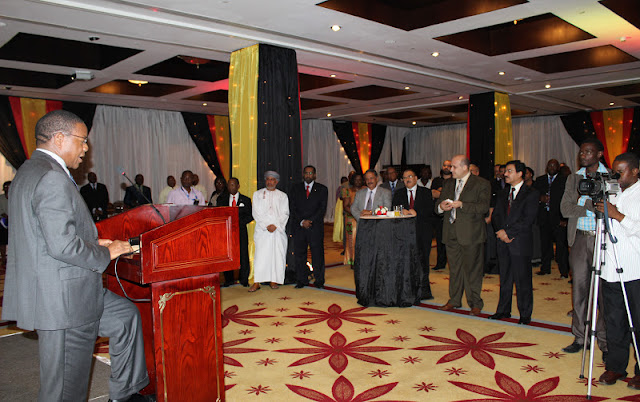Hon. Bernard K. Membe (MP), Minister for Foreign Affairs and International Co-operation gives his opening remarks at the Tanzania-Malawi border dispute meeting, held earlier today at Serena Hotel in Dar es Salaam.
Hon. Ephraim Chiume, Minister for Foreign Affairs of Malawi highlights Malawi's position in respect to the Lake Nyasa border dispute during the meeting with Tanzania. Left is Mr. Patrick Kabambe, Permanent Secretary of the Ministry of Foreign Affairs in Malawi and Mr. Ralph Kasambara (right), Minister of Justice and Attorney General of Malawi.
Tanzania delegation listening to Hon. Chiume when he highlighted the Malawi position.
Hon. Membe (3rd left), gives Tanzania's position in respect to the Lake Nyasa that the boundary is to the median line of the Lake. Left is Hon. Mahadhi Juma Maalim (MP), Deputy Minister for Foreign Affairs and International Co-operation, Justice Fredrick Werema (2nd left), Attorney General for Tanzania. Others are Mr. John M. Haule (4th left), Permanent Secretary to the Ministry of Foreign Affairs and Ambassador Irene Kasyanju (5th left), Director of Legal Affairs Unit at the Ministry of Foreign Affairs.
Tanzania delegation, that include H.E. Patrick Tsere (right), Ambassador of the United Republic of Tanzania to Malawi.
Malawi delegation.
"We have agreed to disagree," says Hon. Membe, while talking to Malawi's delegation led by his counterpart Hon. Ephraim Chiume (not in the photo). Others in the photo are Hon. Mahadhi Juma Maalim (MP) (2nd left), Deputy Minister for Foreign Affairs and International Co-operation, Justice Fredrick Werema (3rd left), Attorney General for Tanzania. Also in the photo are Mr. John M. Haule (2nd right), Permanent Secretary to the Ministry of Foreign Affairs and Ambassador Irene Kasyanju (right), Director to the Legal Affairs Unit at the Ministry of Foreign Affairs.
Hon. Chiume addresses a press conference, while Hon. Membe listens attentively before his turn.
Hon. Membe addresses members of the press.
Lake Nyasa: We have Agreed to Disagree
By TAGIE DAISY MWAKAWAGO
The Minister for Foreign Affairs and International Co-operation, Hon. Bernard K. Membe (MP), said that Tanzania and Malawi have agreed to disagree on the merits of the Lake Nyasa border dispute.
Speaking to the reporters during the joint press conference with his counterpart, Hon. Ephraim Chiume of Malawi, Hon. Membe said that there are respectively fundamental differences between the two countries.
“Malawi is still firm with Article 1, Subsection 2 of the 1890 Heligoland Treaty, which stipulates that Lake Nyasa border demarcates in the Northern part of Mozambique, which is to the Eastern shore of the Lake in Tanzania side,” said Hon. Membe.
For Tanzania, she still maintains that Article 6 of Heligoland Treaty stipulates that boundary issues shall be in accordance with the local requirements. Thus, Tanzania still insists and maintains that the frontier demarcating between these two contiguous disputing states passes in the middle of the Lake Nyasa.
“With that, we have jointly agreed to seek a third party mediator to resolve this dispute amicably and peacefully,” said Hon. Chiume.
The parties agreed that the mediator should come from the Forum made of the former African Heads of State and Government and in particular from the Southern African Development Community (SADC). “The Forum has 37 members who are retired, democratically elected leaders and whereby 10 of the members are from SADC countries,” said Hon. Membe.
Further to their agreement, the two Ministers told reporters that on 24 November of this year, they will hand deliver formal letter of application to the Forum. It is said that in that application the parties will seek a mediator that is consisted of the 10 SADC members and jurists.
“We have also jointly agreed that the SADC Forum team shall have three months starting January 2013 to complete this exercise,” said Hon. Membe, adding that the team will be given additional time if necessary.
In concluding the joint press conference, both Ministers expressed their eagerness to resolve this border row amicably and peacefully. However, if mediation process is fully exhausted, then the International Court of Justice will be the last resort.
End.





















































